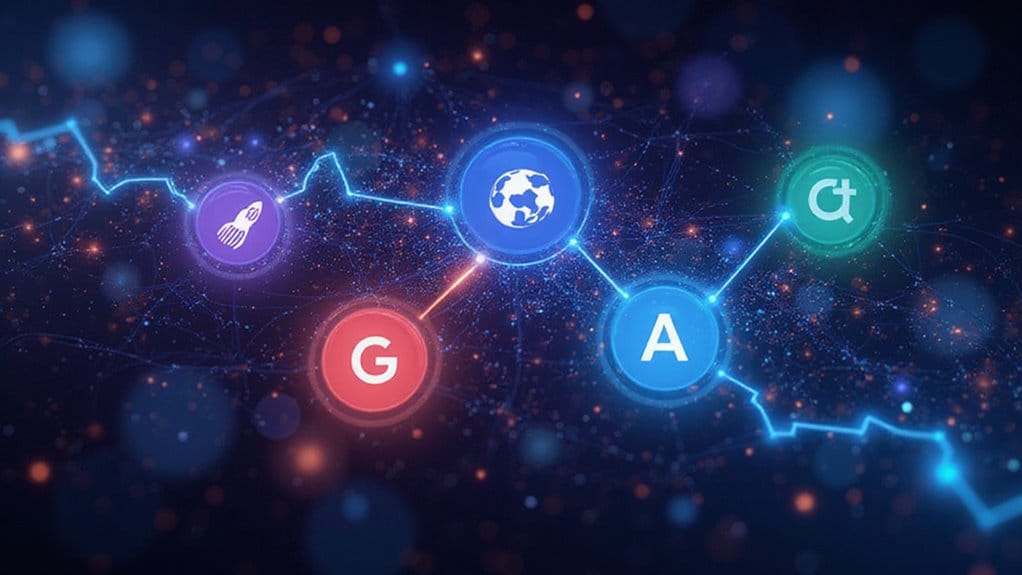Choosing the best AI certification can feel like maneuvering through a tricky maze, but don’t panic! First, pinpoint your interests—are you into machine learning or natural language processing? Next, compare certifications to see what aligns with those interests. Look for hands-on projects; theory alone won’t cut it! And don’t forget to check if industry leaders recognize the program. Finally, weigh your learning style—online or in-person? Make your choice wisely, and stick around to discover more essential tips!

Have you ever wondered how to leap into the booming field of artificial intelligence? It’s not just a trend; it’s a revolution! As industries increasingly embrace AI, the demand for skilled professionals is skyrocketing.
So, how do you choose the right AI certification to catapult your career? Let’s break it down.
First, consider your career goals. Do you want to plunge into machine learning, or are you more intrigued by natural language processing? Align your certification choice with your aspirations. A quick certification comparison can reveal which programs focus on your areas of interest. Remember, not all certifications are created equal!
Consider your career goals and choose an AI certification that aligns with your aspirations—focus on what truly interests you!
Next, keep an eye on industry trends. The tech world moves fast, so make certain the curriculum you pick is up-to-date with the latest advancements. If a certification program doesn’t mention deep learning or computer vision, you might as well be learning how to use a rotary phone. Ouch! With increased demand for specialized AI certifications, it’s essential to choose a program that remains relevant and forward-thinking. Additionally, ensure that your chosen certification covers essential AI concepts to give you a comprehensive understanding of the field. Moreover, several certifications are recognized by leading tech companies, which can significantly boost your employability.
Now, let’s talk prerequisites. Many certifications require a background in computer science, programming skills, and some math knowledge. Don’t panic! If you’re not a math whiz, some programs like IBM’s Applied AI Professional Certificate are designed for beginners. It’s your ticket to understanding AI basics without the brain freeze.
Hands-on experience can’t be overstated. Look for programs that offer practical projects. Just reading about AI won’t cut it; you need to apply what you learn. Check if the certification is recognized by industry giants—this enhances your credibility and job prospects.
Finally, consider the format. Online courses offer flexibility, while in-person classes provide direct interaction. It’s your choice!
But whatever you do, don’t dawdle. The AI job market waits for no one. So, roll up those sleeves, pick a certification that suits you, and get ready to ride the AI wave. The future is waiting!
Frequently Asked Questions
What Prerequisites Are Needed Before Pursuing an AI Certification?
Before diving into an AI certification, one must possess basic knowledge in math and statistics—don’t worry, it’s not rocket science!
Programming skills, especially in Python or R, are often essential. Some certifications might even let you slide in without any specific educational background.
Still, a solid foundation will save you from drowning in technical jargon. So, get your skills sharp, and prepare to tackle those exams with confidence!
How Long Does It Typically Take to Complete an AI Certification?
Completing an AI certification can take anywhere from a few weeks to several months. It hinges on your prior knowledge, study schedule, and the certification format—online courses often offer flexible pacing.
For instance, an AWS AI Practitioner might take a few weeks, while an extensive MIT Professional Certificate could span months.
Don’t underestimate exam prep time! So, plan wisely; your future in AI depends on it! And yes, procrastination won’t help.
Are There Any Age Restrictions for Enrolling in AI Certification Programs?
Are there age restrictions for AI certification programs?
Generally, no strict rules exist, but program policies often assume participants are 18 or older, given the complex material.
While those 13 and up can usually enroll with a self-declaration, parental consent might be a must if under 18.
So, check the specific program’s guidelines and verify you meet any age eligibility.
Don’t plunge in blind—your future in AI could depend on it!
Can I Pursue Multiple AI Certifications Simultaneously?
Yes, pursuing multiple AI certifications simultaneously is possible, but balance your time wisely!
Consider the certification benefits: credibility, skill enhancement, and networking opportunities. However, don’t bite off more than you can chew!
Assess your eligibility and manage your resources. Prioritize your career goals, or risk losing focus.
What Is the Average Cost of AI Certification Programs?
The average cost of AI certification programs can vary wildly—think hundreds to thousands of dollars.
Don’t just pick the cheapest option; look at the program features. Is it thorough? Does it include hands-on projects?
A solid certification can pay off by boosting your job prospects and salary. So, weigh that cost comparison carefully!









